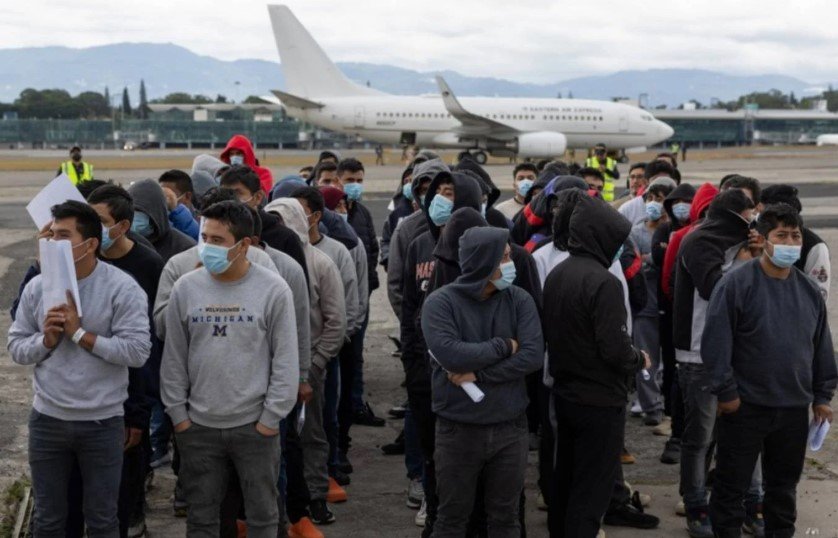Colombian Government Caves to Trump’s Demands, Resuming Deportation Flights and Avoiding Sanctions
In a dramatic shift, the Donald Trump administration has decided to suspend its sanctions on Colombia, following a major concession by the Colombian government. The decision comes after Colombia agreed to resume deportation flights for illegal aliens back to the South American country, effectively reversing its previous stance.
The breakthrough deal, made public on Sunday, comes after weeks of tense negotiations between the United States and Colombia. Under the agreement, Colombia will accept all deportees from the U.S., including those transported on U.S. military aircraft. White House Press Secretary Karoline Leavitt confirmed that the tariff sanctions imposed on Colombia would be “held in reserve,” pending the successful return of the first planeload of Colombian deportees.
Pressure from Washington and the U-Turn
The escalating tension between the U.S. and Colombia reached a boiling point earlier this year when the Trump administration imposed stringent sanctions in response to Colombia’s refusal to accept deportation flights. These sanctions, aimed at penalizing Colombia for its failure to cooperate with U.S. immigration enforcement, included hefty tariffs and trade restrictions, which threatened to hit Colombia’s economy hard.
However, the pressure from the U.S. proved overwhelming. Colombian President Juan Manuel Santos, under increasing pressure, reversed his position on the issue. The U.S. administration demanded that Colombia take back all deportees, regardless of their legal status or the manner of their transportation, including military aircraft. The Colombian government’s agreement to these terms marked a significant shift in its foreign policy towards the U.S., signaling a willingness to accommodate Trump’s demands.

Trump’s Tough Stance on Illegal Immigration
The deportation agreement with Colombia is seen as a direct result of Trump’s staunch stance on illegal immigration. The former U.S. president has long advocated for a harder approach to immigration, both at the U.S. border and through foreign diplomatic efforts. Trump’s administration had previously made it clear that it would leverage trade and diplomatic pressure on countries that failed to take responsibility for their own nationals who had overstayed their visas or entered the U.S. illegally.
By holding the tariffs “in reserve,” the Trump administration left the door open for further action should Colombia fail to meet the terms of the deal. While the temporary suspension of the sanctions has been celebrated by some, the broader implications for U.S.-Colombian relations remain uncertain. Trump’s visa restrictions on Colombian officials are still in place, and enhanced customs inspections of goods from the country will continue.
The Diplomatic Calculations
The resolution of this tariff war comes amid broader geopolitical maneuvering in the region. Colombia has long been a key U.S. ally in Latin America, especially in the fight against drug cartels and organized crime. However, the issue of illegal immigration has created a rift in this otherwise close relationship. As part of the agreement, Colombia is expected to enhance cooperation with U.S. authorities on immigration enforcement and border security, which could strengthen ties between the two nations.
Yet, Colombia’s concession comes at a political cost. Critics argue that the country’s decision to comply with Trump’s demands could alienate some of its domestic supporters, particularly those who advocate for more lenient immigration policies. Moreover, the use of U.S. military planes to deport Colombians has raised concerns over the broader implications for sovereignty and human rights.
Key Points of the Agreement:
- Colombia will accept all deportees, including those on U.S. military aircraft.
- U.S. tariffs on Colombia are paused but remain “held in reserve.”
- Trump maintains visa restrictions on Colombian officials.
- Enhanced customs inspections of Colombian goods to continue.
What’s Next for US-Colombia Relations?
As Colombia agrees to Trump’s terms, the future of U.S.-Colombia relations will be shaped by the success or failure of this deal. The agreement has a clear deadline—the successful return of deportees to Colombia on U.S. military flights. If Colombia fails to comply, it risks the reimposition of tariffs, along with potentially more severe sanctions.
However, the long-term impact of this diplomatic maneuver remains uncertain. Some analysts believe that while the tariff war may have temporarily subsided, the underlying issues—particularly the handling of illegal immigration—remain unresolved. As both nations move forward, the question of how to address the root causes of illegal immigration in Colombia and the region will likely become even more pressing.
The deal marks a temporary victory for Trump, who has long framed the issue of illegal immigration as a key point in his foreign policy. But with the situation still fluid, only time will tell whether this diplomatic détente is the start of a new chapter in U.S.-Colombian relations, or just another pause in a tense and ongoing struggle.
